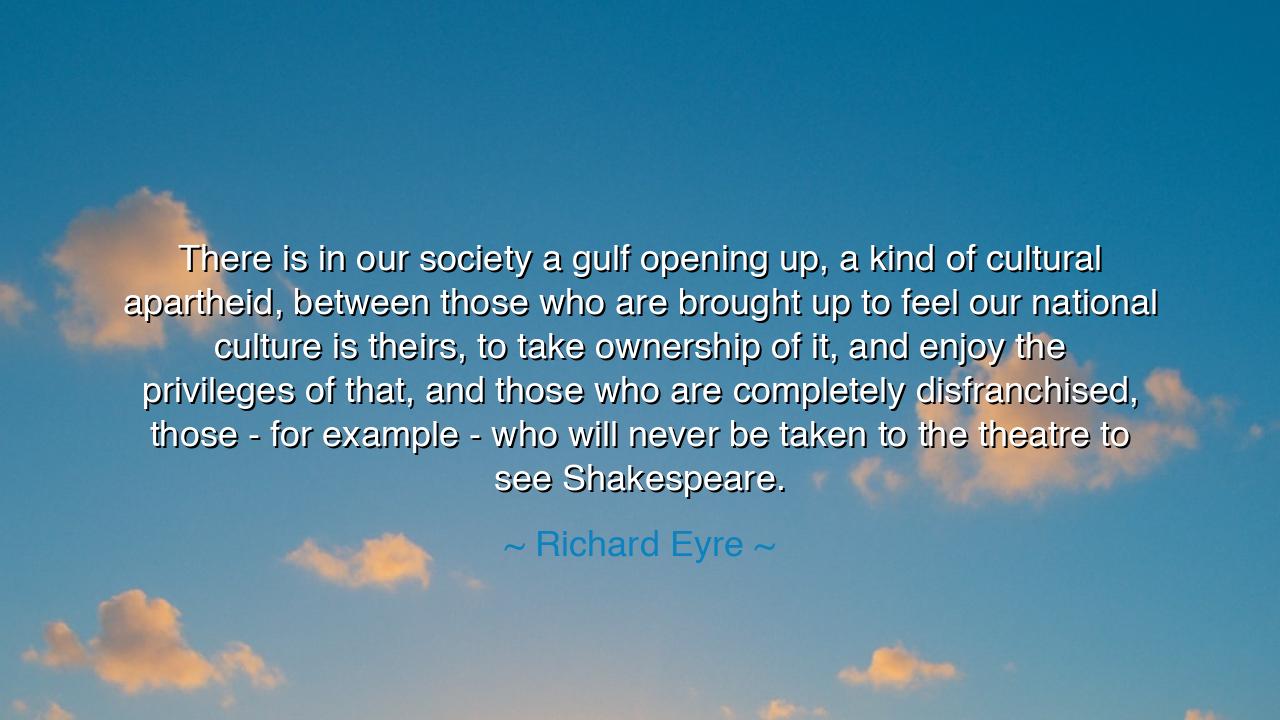
There is in our society a gulf opening up, a kind of cultural
There is in our society a gulf opening up, a kind of cultural apartheid, between those who are brought up to feel our national culture is theirs, to take ownership of it, and enjoy the privileges of that, and those who are completely disfranchised, those - for example - who will never be taken to the theatre to see Shakespeare.






Hear now the lament of Richard Eyre, a steward of the stage and a guardian of culture, who spoke these words with sorrow and warning: “There is in our society a gulf opening up, a kind of cultural apartheid, between those who are brought up to feel our national culture is theirs, to take ownership of it, and enjoy the privileges of that, and those who are completely disfranchised, those—for example—who will never be taken to the theatre to see Shakespeare.” In these words is revealed a fracture that runs deeper than wealth alone, a divide of spirit and belonging, between those who are nourished by their culture and those who are left outside its gates.
For what is a society, if not the stories it tells itself? The tales of its poets, the visions of its painters, the voices of its singers—these are the food of the soul, the inheritance of every child. But when this inheritance is locked away, when some are taught that the treasures of art and tradition are not for them, a gulf yawns wide. This is not merely poverty of coin, but poverty of imagination, a disfranchisement more subtle and more cruel, for it denies the spirit the chance to grow.
Consider the Athens of Pericles, where the theatre was not for the few but for the many. On festival days, the citizens gathered, rich and poor alike, to hear the words of Aeschylus and Sophocles, to weep and to learn together. Even slaves and foreigners could stand in the crowd, absorbing the lessons of tragedy and comedy. The city understood that its culture was not a private treasure for the elite, but the shared foundation of its society. And in this shared ownership, Athens found strength and unity. Contrast this with lands where art was hoarded by the powerful, and you will see nations divided, hollow at their core.
The story repeats through time. In the palaces of Europe, opera and literature once belonged only to kings and nobles, while the common people were told they had no share. But when revolution came, when voices like Victor Hugo’s rose to cry for justice, the cultural apartheid was challenged. Writers and artists brought the stage, the song, the novel into the lives of the many, and in doing so, ignited new movements of freedom and reform. The gulf between the privileged and the disfranchised narrowed, if only for a time, proving that art, once shared, becomes a fire of transformation.
Eyre’s warning is clear: to deny a people access to their national culture is to breed alienation, resentment, and division. A child who never sees Shakespeare, who is never told that the beauty of language and story is theirs to claim, grows up outside the gates of belonging. They may live in the nation, but they do not feel of the nation. And a society that leaves many of its children in such exile cannot call itself whole.
So let the lesson be heard: culture must not be the possession of the few, but the inheritance of all. If you are privileged to taste its riches, share them. Take your children, your neighbors, your community into the halls of theatre, into the galleries of art, into the libraries of wisdom. Do not hoard these treasures behind the walls of cost or class, for culture locked away is culture dying. But culture shared becomes culture renewed, passed on like a flame that lights every corner of society.
Thus remember Richard Eyre’s words: beware the gulf, beware the cultural apartheid that divides spirit from spirit. Strive instead to open the doors, to make the stage, the book, the painting, and the song belong to all. For only when every citizen feels their share in the national culture can a nation truly stand strong, not divided, but united by the stories that bind them together.






AAdministratorAdministrator
Welcome, honored guests. Please leave a comment, we will respond soon